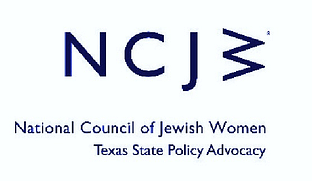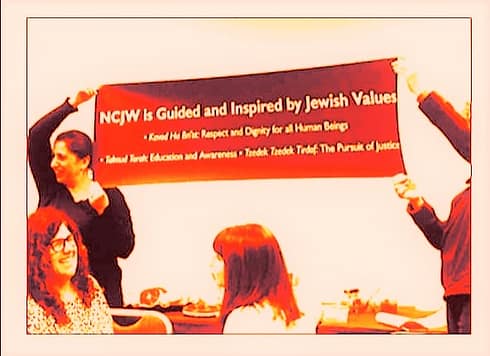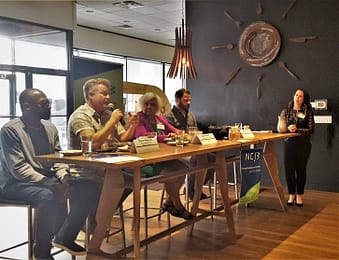GUN VIOLENCE PREVENTION
Gun Violence Prevention
The National Council of Jewish Women (NCJW) is a grassroots national organization of volunteers and advocates who turn progressive ideals into action. Inspired by Jewish values, NCJW strives for social justice by improving the quality of life for women, children, and families and by safeguarding individual rights and freedoms.
The United States has higher rates of gun violence than any other developed nation in the world, with over 36,000 individuals killed every year by guns[i] and over a hundred thousand injured[ii]. The proliferation of, and easy access to, guns has resulted in an epidemic of gun violence. Support for the Second Amendment goes hand-in-hand with keeping guns away from criminals and other dangerous people and with common-sense public safety laws.
We therefore ask our Texas legislators to support the safe storage and purchase of handguns, prevent reckless use of handguns, and educate the public about the risks of firearm suicide.
We urge the Legislature to:
- SUPPORT SAFE STORAGE: SB 158 (Rodríguez), SB 204 ( Huffman), HB 854 (Moody) These bills raise penalties for allowing a child access to a firearm. Under the bills, an adult could be charged with a Class B misdemeanor if a child is found in possession of their firearm. If that child harms him or herself, or another person, it would be a state felony. We also would support increasing the age of access to 18.
- SUPPORT SUICIDE PREVENTION: HB 316 (Howard) This bill would require the Texas Department of Public Safety (DPS) to develop and implement a campaign designed to encourage firearm safety and improve public awareness on the topics of: 1) prevention of firearm accidents involving children, 2) suicide prevention and 3) the safe handling and storage of firearms.
- SUPPORT PREVENTION OF RECKLESS USAGE: HB 86 (Martinez)Anyone caught firing a gun into the air could be charged with a Class A Misdemeanor. If the stray bullet(s) hits someone, they could be charged with a Felony.
- SUPPORT BACKGROUND CHECKS AT GUN SHOWS: HB 1169 (Anchia) and HB 195 (Reynolds) We also ask our legislators to support safer gun buying practices in Texas, including closing the loophole that currently allows Texans to purchase guns at gun shows without a NICS background check. Americans almost universally support background checks[iii] and evidence from states that have already closed this loophole shows that background checks save lives.[iv] Twenty-one states have closed the loophole on background checks, with New Mexico being the most recent one on March 5, 2019.
- SUPPORT PREVENTION OF LIEING ON NICS FORM: HB 95 (Hinojosa) Creates an offense when a prohibited person purchases or attempts (also known as “lie and try”) to purchase a firearm. The bill also requires licensed firearms dealer under 18 U.S.C. Section 923 to report denials to DPS and requires DPS to investigate and refer the case for prosecution, if appropriate.
- OPPOSE ARMING TEACHERS: SB 243 (Creighton), SB 244 (Creighton), and SB 406 (Birdwell). We also know of the dangers of guns around children and asks our legislators to vote AGAINST bills that would allow more guns to be carried by teachers. Introducing guns into our classrooms will make schools even more dangerous for our kids. There is no evidence that arming teachers will prevent mass shootings, although there is evidence that more guns around children and teens creates more danger[v]. We ask you do NOT support any similar bills.
- SUPPORT EXTREME RISK PROTECTION ORDERS: HB 131 (Moody) and SB 157 (Rodriguez): We also are in favor of Extreme Risk Protection Orders, or a Red Flag bill, which can save lives by creating a way for family members and law enforcement to act when a person is in crisis or threatening themselves or others. In 42% of mass shootings, the attacker exhibited similar warning signs before the shooting.[vi] Such laws could also prevent firearm suicides. We ask the legislators, however, to NOT infringe on the current, more restrictive, family violence protective orders for domestic violence abusers and ask that such bills contain family violence exclusion provisions, in order to clarify that they are intended for other purposes.
[i] Centers for Disease Control and Prevention. National Centers for Injury Prevention and Control, Web-based Injury Statistics Query and Reporting System (WISQARS) Fatal Injury Reports. A yearly average was developed using five years of most recent available data: 2013 to 2017. While it is broadly considered to be the most comprehensive firearm fatal injury source, two of the intent categories—Shootings by law enforcement and Unintentional Deaths—are estimated to be greatly underreported. This underreporting is largely due to missing information on death certificates, which may result in misclassification of intent. Multiple media sources and nonprofit groups have tracked shootings by law enforcement but no reliable public database captures unintentional shootings. Intent category averages may not total to yearly average due to rounding.
[ii] Centers for Disease Control and Prevention. National Centers for Injury Prevention and Control, Web-based Injury Statistics Query and Reporting System (WISQARS) Nonfatal Injury Reports. The CDC derives national estimates of nonfatal firearm injuries treated in hospitals from a survey of hospitals known as the National Electronic Injury Surveillance System (NEISS). According to the CDC, some of these estimates may be unstable. Nonetheless, data provided by the CDC is the most comprehensive, publicly-available resource for nonfatal gunshot injuries. To account for fluctuations between years, a yearly average was developed using five years of the most recent available data: 2013 to 2017. Intent category averages may not total to the yearly average due to rounding.
[iii] Pew Research Center. 2018. Gun Policy Remains Divisive, But Several Proposals Still Draw Bipartisan Support. Available at https://pewrsr.ch/2SnLhzn
[iv] Crifasi CK., Meyers JS, Vernick JS, & Webster DW. 2015. Effects of changes in permit-to-purchase handgun laws in Connecticut and Missouri on suicide rates. Preventive Medicine. 2015(79):43–49.
[v] Anglemyer A, Horvath T, Rutherford G. The Accessibility of Firearms and Risk for Suicide and Homicide Victimization Among Household Members: A Systematic Review and Meta-analysis. Ann Intern Med. 2014; 160: 101–110.
[vi] Everytown f=for Gun Safety, Mass Shootings in the United States: 2009-2016, 2017. Available at: http://every.tw/2BvFkXr.
NCJW DALLAS RAISES AWARENESS ON GUN VIOLENCE
NCJW Dallas WEARS ORANGE every day. We advocate for GUN SAFETY legislation. Our projects support victims of DOMESTIC VIOLENCE. We EDUCATE.
17 children accidentally shot themselves or someone else in Texas in 2015.
Guns were the second cause of accidental death for children in Harris County between 2011-2014.
687 women were killed by an intimate partner with a firearm in Texas between 2007-2016.
It’s estimated that nearly 40% of Texas households have guns.
200,000 children are estimated to live in homes with loaded,
unlocked firearms accessible to them..
Study found that household gun ownership doubles the risk
of homicide and triplesthe risk of suicide for those with access to
firearms.
#WearOrange
NCJW Dallas Book Launch in TJP
REPRODUCTIVE JUSTICE
Reproductive Justice
The National Council of Jewish Women works to advance the well-being of women, children, and families. NCJW believes that religious liberty and the separation of religion and state are constitutional principles that must be protected and preserved in order to maintain our democratic society.
NCJW regards advancing reproductive justice as integrally bound to protecting a woman’s religious liberty — her ability to make personal decisions based upon her own faith and moral values. Every woman should be able to access the care she needs without jeopardizing her economic security or other human needs. We support every woman’s ability to make her own moral decisions about her body and reproductive life, regardless of her income, job, source of insurance, immigration status, sexual orientation, gender identity, race, or other factors.
NCJW endorses and resolves to work for:
- Comprehensive, confidential, accessible family planning and reproductive health services, regardless of ability to pay.
- Quality, comprehensive, nondiscriminatory health care coverage and services, that are affordable and accessible for all.
- The right to have children or not have children, and to parent the children we have in safe and healthy environments
- The protection of every female’s right to reproductive choices, including safe and legal abortion, medically accurate information, and the elimination of obstacles that limit reproductive freedoms. These rights are integrally bound to religious freedom—one of the cornerstones of our constitution. NCJW strongly believes that legislating from one religious view point on this very personal issue restricts religious liberty for all of us.
We urge the Legislature to:
- Support HB 241(Farrar) HB 248 (Farrar) and HB 249 (Farrar)
- HB 241 Would extend Medicaid coverage for 12 months after pregnancy. HB 248 Removes medical inaccuracies. Would remove medically-inaccurate information from the materials that states mandates be given to women seeking an abortion. HB 249 Would eliminate certain requirements that create a 24-hour waiting period for women who seek an abortion. Research has shown that it does not change minds
- Support HB 513 (Howard) and HB 800 (Howard) HB513 Would establish a pilot program for distributing long-acting reversible contraception to public school students. HB 800 would require the state’s children’s health plan to include coverage for birth control.
- Support HB 606 (Thierry) Would automatically enroll a woman who is a Medicaid recipient into the Healthy Texas Women program.
- Support HB 895 (Cole) Would require the Medicaid program to include abortion care coverage.
- Support HB 366 (González) Would require the Texas State Board of Education to create a curriculum on healthy relationships.
- Support HB 60 (Ortega) Would require institutions of higher education to inform students about women’s health programs administered by the Texas Health and Human Services Commission.
- Oppose SB 389 (Campbell) and SB22 (Campbell) SB 389 (Campbell) These bills would prohibit government entities from engaging in transactions or contracts with an abortion provider. SB 22 will ban any local government from partnering with trusted health care providers, including Planned Parenthood. Planned Parenthood has partnered with local governments to provide much needed health care, education and outreach, including providing cancer screenings, STI testing, and HIV-prevention and Zika-prevention outreach to at-risk populations.
- Oppose HB 47 (Swanson) Would revoke the medical license of doctors who perform elective abortions, with some exception
- Oppose HB 895 (Tinderholt) Would make abortion illegal.
- Oppose HB 1012 (Bohac) Would ban the distribution of any kind of contraceptive in public school districts and make other changes to School Health Advisory Councils, which are tasked with making recommendations on sex education policies.
- Oppose HB 1500 (Cain) Would ban abortions at any time after a fetal heartbeat is detected.
- Oppose SJR 377 (Hall) and SJR 3 (Hall) SJR 377 Would curtail a School Health Advisory Council’s ability to make certain recommendations. SJR 3 Would amend the state constitution to prohibit abortion.
VOTING RIGHTS
Protecting Voting Rights and Encouraging Voter Engagement
Voting is the lifeblood of democracy, ensuring that the government remains responsive to the demands and needs of its citizens and respects their liberties. Democracy works best when all eligible voters can participate. Throughout its history, National Council of Jewish Women (NCJW) has worked to expand voting rights, drive voter turnout, educate on the issues and encourage voter engagement. We pursued the expansion of voting rights for historically disenfranchised communities during the suffrage movement, campaigned for the passage of the Voting Rights Act (VRA) of 1965 and championed the effort to change the voting age to 18. Our work continues today with the goal of ensuring that every eligible voter is able to register to vote, cast a ballot, and engage in all levels of government in a meaningful way. Unfortunately, in the past five years, policies to disenfranchise voters have increased and become more insidious. The Supreme Court’s Shelby County v. Holder decision in 2013 removed a key provision of the VRA, weakening a half-century of voter protection efforts. NCJW, at the local, state and federal level, has responded by renewing its efforts to protect voting rights. NCJW members and supporters in Texas have joined forces to protect and enhance voting rights within our state.
We urge the Legislature to support passage of bills that:
- Ensure impartial treatment of all voters
- Allow same day voter registration and an opportunity for 16 and 17 year olds to pre-register to vote
- Enable and enhance electronic voter registration to: improve voter system security, make voter rolls more accurate, and save millions of dollars caused by paper registration.
- Allow for automatic voter registration when voters come into contact with a government agency. AVR has been approved in 13 states.
- Maximize use of uniform election dates, efficiently share polling locations
- Provide for improved voting equipment and systems, including paper audit trail equipment, where voters can verify their selections before casting their ballot
- Increase cyber security and train election officials in the use of cyber security
- Offer more clearly stated and easier to read election forms
- Improve the time periods and mechanisms for requesting ballots by mail and the return ballot
We urge the Legislature to actively oppose:
- Bills that result in voter suppression
- Discriminatory voter photo ID laws (Perhaps the most popular measures to block access to voting are voter ID laws).
- Last minute efforts to create barriers to voting on Election Day
- Declaration of party affiliation when registering
- The appointment of David Whitley as Secretary of State. The Secretary of State is tasked with implementing federal and state election law. In January, Secretary Whitley released a flawed and inaccurate voter purge list to Texas counties, despite knowing that thousands of eligible voters might be on the list. When done properly, maintaining and updating voter rolls are key to election integrity. However, too often voter purges are used to block voters from the ballot without adequate cause.
- Bills that would codify the Secretary of State’s right (see above) to purge lists.
While there are many improvements to be made, we encourage the continuance of the following model laws: Texas is a leader in returning suffrage to citizens who have been in the criminal justice system and fulfilled their punishment. Our early voting period, including weekends, provides opportunities to all unable to vote on Election Day. Both of these laws should be celebrated and maintained.
We urge the House Redistricting Committee Chair, Phil King (R-Parker/Wise Counties), and Vice Chair, Chris Turner (D-Tarrant County), to continue to hold public hearings. Gerrymandering (the drawing of political districts for the benefit of a particular party) is a threat to voting rights because it results in polarization of our citizenry and prevents communities from working together. Districts are drawn at the state level after every 10 years based on the census. Some states have impartial redistricting commissions, while others, like Texas, leave it to the legislature. Last session, the House Redistricting Committee never met, which meant that Texans were not able to voice their concerns about our broken redistricting system. The appointment this year of a bi-partisan sub-committee to schedule hearings around the state is a good start. We believe that:
- Partisan data should not be permitted when drawing our election maps
- Cities, counties and school districts should not be split unless absolutely necessary
- Districts should be drawn based on input from the community
We Urge the Legislature to:
- SUPPORT HB 79 (Johnson) which would provide for online voter registration, available in 37 states.
- SUPPORT HB 361 (Israel, Zerwas and Wilson) This bill creates an online voter registration system. Has 60+ sponsors.
- OPPOSE HB 378 (Lang) would make it more difficult to register to vote. If passed, this bill would require proof of citizenship to register.
- OPPOSE SB9 (Hughes) This bill makes it more difficult to vote and perpetuates misconceptions and fear about election safety. The bill would impose substantial unnecessary new barriers on those needing assistance to vote, particularly elderly & disabled voters. It would loosen safeguards protecting voters’ private information making voter purges such as the illegitimate one recently attempted by Secretary of State Whitley easier. It would bolster an ongoing campaign of selective criminal prosecutions aimed at deterring people from voting, particularly those from marginalized communities.
- OPPOSE SB 74 (Hall) would slash early voting days by 7 (including weekends) making polls less accessible.
- OPPOSE SB 953 (Fallon) and SB960 (Bettencourt/Perry) These bills together would require voter registrars to immediately remove every person who at any one point indicated to a government agency that they were not a citizen and would subject any registrar who doesn’t comply with immediate removal to a civil penalty and possible Class A misdemeanor
- OPPOSE HB 154 (Swanson) would require a voter using a non-photo ID to submit to being photographed by an election official. Would also authorize election officials to take a photo if they suspect an ID is fake.
EDUCATION
Funding a Free and Appropriate Education for all Texas Children
The National Council of Jewish Women strives for social justice by improving the quality of life for women, children, and families and by safeguarding individual rights and freedoms. The National Council of Jewish Women believes that every child, no matter their zip code, deserves a quality, free public education.
NCJW urges you to ensure adequate funding by providing a school finance system that provides:
- taxpayer equity and the equitable distribution of funds
- equitable funding that provides safe and secure facilities
- funds the ability to hire and retain highly qualified teachers and staff
- funds to implement an early reading program that funds full-day, high quality prekindergarten for qualifying four-year-old children
- more money for dual language students
- increased support for students with dyslexia and related disorders
- additional resources to low income students that prioritizes those with the highest needs.
NCJW urges you to keep public dollars in public schools. We oppose all vouchers, “tax credits”, “scholarships”, “grants”, “school choice”, “taxpayer savings” to fund private, for-profit, and religious schools.
- Vouchers drain our public schools of resources: Texas is ranked 43rd nationally in the amount spent per student.
- Students who leave public schools will take funding with them, but public schools will have the same expenses, as they do not decrease proportionately to the classroom size.
We urge the Legislature to:
Support HB 3 (Nelson). NCJW Texas supports Chairman Dan Huberty, Speaker Dennis Bonnen, and the members of the House for their efforts in developing a fair and comprehensive public school finance bill. This bill proposes meaningful investments in equitable funding, hiring, pre-K instruction, dual language and low income students. This bill also proposes much needed property tax relief, while committing to giving districts the flexibility and funding to provide increased teacher and staff pay. We also believe it is important that:
- the state’s share of funding to the Foundation School Program be increased to 50% – because of the state’s lack of support of the Foundation Program, local property taxes have had to cover the majority of public school costs;
- flexibility be provided for teachers and principals to appropriately manage disruptive students;
- formula-funded be provided for voluntary full day prekindergarten;
- adequate principal and teacher training be provided to address the needs of the most challenging populations;
- the state preserves the defined benefits plan for retired educators and ensures financial stability of the active and retiree health care systems, and that
- state funding be increased to assist with swelling healthcare costs associated with TRS-ActiveCare and TRS-Care.
Support HB 403 (Thompson) and SB 458 (Huffman) Texas has made efforts to combat the ballooning of human trafficking: 35,000 Texas children attend public schools that are within 1000 feet of illegal massage businesses. As everyday caregivers and mentors, teachers and school staff may represent the best – and for some – the only chance that the victimization of vulnerable youth be properly reported. HB 403 supports a mandated human trafficking training for school board trustees and superintendents. As a result, additional training can be implemented to the other school employees, without sacrificing local control.
Oppose SB 2 (Bettencourt). SB 2 would cap revenue growth at the local level at 2.5% above the previous year’s revenue. Triggering a roll back election, if revenue growth exceeded that rate, would limit local officials’ ability to improve or expand local services.
- SB2 would not lower property taxes;
- SB2 would not address increases in property appraisals;
- SB2 would reduce local control;
- Texas ranks 43rd out of 50 states in per-pupil spending;
- Texas spends $4041 less per student each year than the national average;
- Texas would have to invest $21.8 billion dollars more each year just to be “average;”
- Texas has 5.4 million public school students, more than 10% of all US students.
NCJW Dallas Hosts Party to Launch New Book
FOR IMMEDIATE RELEASE Contact: Korina Smith
214-368-4405
korinasmith@ncjwdallas.org
NCJW, Dallas Hosts Party to Launch New Book
An invitation — we hope you’ll come!
April 2, 2019
5 to 7 p.m.
Communities Foundation of Texas
5500 Caruth Haven Lane
The hosts will be Dallas’ National Council of Jewish Women, a group that is marking 100 YEARS of focusing on some of our city’s root problems. The centerpiece of the evening will be the launch of their just-off-the press coffee-table-book, Repairing Our World: The First 100 Years of the National Council of Jewish Women. It will be a celebration of altruism by volunteers, something truly refreshing in these times of cheating to get into college and intolerance of anyone not-like-me.
So what has NCJW accomplished in Dallas in those 100+ years? Here’s a sampling (check out the book for more details!).
In the early 1900’s, they
- Were the first to place volunteers in public schools
- Were an important catalyst for moving mentally ill inmates from jails to hospitals
- Established a free milk fund to battle tuberculosis
- Assisted in founding the Visiting Nurses Association
- Assisted in founding the Dallas County Society for Mental Health
- Provided daycare and after-school programs for women working during World War II.
After World War II, NCJW, Dallas
- Founded LIFT (Literacy Instruction for Texas) to teach adults basic reading skills.
- Co-founded the Domestic Violence Intervention Alliance
- Founded Foster Care Advocate Services (now CASA)
- Introduced HIPPY, an early-childhood education program, to the Dallas Independent School District.
- Etc., etc., etc.
This book not only catalogs past accomplishments and volunteers, it hopefully also provides a road map for future volunteers who continue to believe in working to better our community. So please be part of the celebration at NCJW Dallas’ launch party! TOGETHER we’ll hoist a glass of wine to honor the past and look forward to a bright future of continuing to “repair our world.”
2019 Winter Meeting – For the Love of Food
NCJW Dallas Raises Awareness on Our City’s “Food Deserts”
March 13, 2019
Our love for fresh food and serving the community radiated during the NCJW Dallas’ Winter Meeting. Over a delicious lunch hosted by Café Momentum, the speakers expressed their concern for the lack of access to fresh food plaguing South Dallas.The discussion revolved around the meaning of “food deserts.” Coined by Daron Babcock, the CEO and founder of Bonton Farms, the term describes areas where access to fresh foods is very scarce or non-existent.
In South Dallas, where Mr. Babcock started his farming experiment to fuel the community with fresh food, employment opportunities and meaningful social interaction, diabetes, heart disease, and obesity rates are skyrocketing. Unemployment follows similar trends, along with criminal activity. Everything is interconnected, because, Mr. Babcock explained, “food is just a piece of the [poverty] puzzle.”
In tandem, Anga Sanders, the CEO and founder of Feed Oak Cliff, pressed on the same concerns. She painted a complex and alarming reality, particularly how food insecurity corrodes many aspects of life. Very emotionally, she dispelled that lack of motivation argument by noting that “even poor mothers want fresh food for their babies,” complementing Mr. Babcock’s take. “Fighting poverty is like climbing Mount Everest in flip-flops,” Mrs. Sanders concluded, and we – the community – need to do much better.
Chad Houser, the founder of Café Momentum, that trains troubled youth in the art of fine cuisine and life, presented more data. Especially linking “food deserts” to health issues and unemployment, Mr. Houser urged for more public awareness on poverty. “People are a product of their circumstances,” he noted, and without looking at poverty through lenses fitted to reality, most efforts – both public and private, won’t have the desired impact.
Filled with valuable lessons and heroic examples of community service, the NCJW Dallas Winter Meeting was food for the soul, a call for action, and a Valentine’s Day well-spent.











